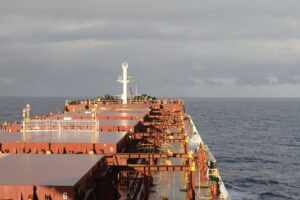The Danish-based global bunker supplier and tanker specialist, Monjasa, has posted its second-best financial performance, despite the high volatility in the shipping market.
The company said Monjasa Holding equity exceeds $400m following its second-best financial year.
Monjasa concluded the year 2023 with a 2% increase in total volume which reached a record 6.5m metric tonnes, compared to the year before with 6.4m mts, of marine fuels supplied to shipowners and operators worldwide.
The net result reached $109m from $171m in 2022, with the company mentioning that “the year concluded above expectations”, which led to a significantly improved consolidated Group equity of $411m, compared to $323m in 2022.
“The total volume of 6.5m tonnes positions Monjasa as the world’s 7th largest global marine fuels supplier,” Monjasa said.
Meanwhile the total number of supply operations rose to 13,962 from 13,425 in 2022.
Now Monjasa expects 2024 to become another positive financial year with a net result in the range of $40-80m.
Anders Østergaard, Monjasa Group chief executive officer, said the company “thrives on navigating new waters and thinking up unexpected solutions.”
“In combination with strengthening our fleet of owned tankers with four acquisitions, this contributed significantly to our financial performance.”
“In a historically strong tanker market, we gained advantage of controlling a larger part of our logistics and having this fully integrated in the marine fuels activities,” he added.
Østergaard said Monjasa has been awarded more long-term contracts involving global fuel supplies to some of the world’s leading shipowners.
“We are of course pleased to see that our services and personal business approach are in demand from this important group of business partners,” he said.
“Altogether, we are very satisfied with this strong set of results and by more than doubling total equity during the past two years, the future is open for the Monjasa Group.”
With 30 vessels in its fleet portfolio, Monjasa navigated the Panama Canal drought issues by providing new refuelling solutions to customers affected by the restricted number of transiting vessels.
And it adapted quickly to match supply and demand in West Africa, where the Red Sea security crisis caused a sudden spike in demand as container lines began rerouting millions of tonnes of cargo south of Africa via Cape of Good Hope.



